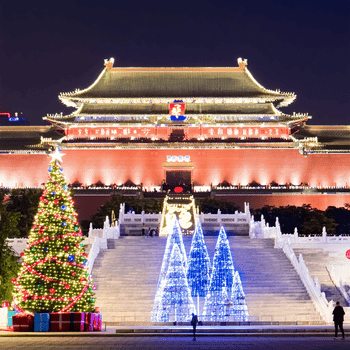
Moving to China as an expat means navigating a complex holiday landscape where Spring Festival fireworks echo through empty streets while you’re craving Christmas cookies, or where Halloween costumes feel oddly out of place against traditional Mid-Autumn lanterns.
After five years of organizing expat holiday gatherings across three Chinese cities, I’ve learned that successful holiday celebrations require more than good intentions—they need practical planning, cultural sensitivity, and realistic expectations.
This comprehensive guide draws from real expat experiences, community organizer insights, and lessons learned from both spectacular successes and memorable failures in creating holiday magic away from home.
Understanding China’s Holiday Calendar & Expat Opportunities
Before planning any celebration, understanding China’s official holiday schedule is crucial. Here’s what every expat needs to know:
Major Chinese Holidays & Expat Implications
| Holiday | Dates (2024-2025) | Duration | Expat Opportunities | Challenges |
|---|---|---|---|---|
| Chinese New Year | Feb 10-17, 2024 | 7 days | Travel together, host fusion dinners | Everything closes, transport chaos |
| Qingming Festival | Apr 4-6, 2024 | 3 days | Cultural exploration trips | Solemn atmosphere, limited festivities |
| Labor Day | May 1-5, 2024 | 5 days | Group trips, outdoor celebrations | Crowds, higher prices |
| Dragon Boat Festival | Jun 10, 2024 | 1 day | Join local races, make zongzi | One-day only, work disruption |
| Mid-Autumn Festival | Sep 17, 2024 | 1 day | Moon-viewing parties, mooncake exchanges | Limited time for celebration |
| National Day Golden Week | Oct 1-7, 2024 | 7 days | Major expat gatherings, travel | Mass tourism, inflated costs |
Pro Tip: Plan Western holiday celebrations during Chinese holidays when locals have time off and venues offer special packages.
Finding Your Expat Holiday Community: City-by-City Guide
Tier 1 Cities (Beijing, Shanghai, Shenzhen, Guangzhou)
Digital Communities:
- WeChat Groups: Search “[City Name] Expats” or “[Nationality] in [City]”
- Shanghai Expat: 50,000+ members, daily events
- Beijing Expat Community: 30,000+ members, holiday-specific subgroups
- Facebook Groups:
- Expats in Shanghai (45k members)
- Beijing Expat (25k members)
- Meetup.com: Active in all tier 1 cities with 500+ events monthly
Physical Locations:
- Expat Bars & Restaurants:
- Beijing: Migas, Great Leap Brewing, 8-Bit
- Shanghai: The Camel, Windows Too, Revolucion Cocktail
- Shenzhen: McCawley’s Irish Pub, The Brew
- Guangzhou: Hooley’s Irish Pub, The Paddy Field
- International Schools & Clubs:
- Most international schools host community events
- Sports clubs (rugby, soccer, cricket) often organize holiday gatherings
- Business associations (AmCham, BritCham, etc.) host formal celebrations
Tier 2 Cities (Chengdu, Hangzhou, Nanjing, Xi’an)
Finding expat communities requires more effort but offers tighter-knit groups:
Strategies:
- Contact international schools directly
- Visit Western-style bars on weekends
- Check university international student offices
- Join city-specific Facebook groups (typically 1,000-5,000 members)
Example – Chengdu:
- WeChat: “Chengdu Expat” (3,000 members)
- Venues: The Temple House Bar, Bookworm Café
- Annual events: Thanksgiving at Chengdu International School
Smaller Cities & Rural Areas
Reality Check: Expect 10-50 expats total. Focus on quality over quantity.
Connection Methods:
- English teaching Facebook groups
- Contact nearest international business park
- University foreign affairs offices
- Expat teachers often become informal community organizers
Practical Holiday Planning: Budget & Logistics
Budget Planning Guide
| Holiday Type | Tier 1 Cities | Tier 2 Cities | Small Cities |
|---|---|---|---|
| House Party (10-15 people) | ¥800-1,500 | ¥500-1,000 | ¥300-600 |
| Restaurant Gathering (20+ people) | ¥100-200/person | ¥80-150/person | ¥60-120/person |
| Venue Rental Event | ¥2,000-5,000 | ¥1,000-3,000 | ¥500-1,500 |
| Decorations & Supplies | ¥300-800 | ¥200-500 | ¥150-300 |
Money-Saving Tips:
- Partner with venues for reduced rates during Chinese holidays
- Use Taobao for decorations (order 2 weeks ahead)
- Potluck style reduces individual costs by 60-70%
Essential Apps & Platforms
| Purpose | Primary App | Alternative | Notes |
|---|---|---|---|
| Group Communication | Telegram (VPN required) | Create holiday-specific groups | |
| Event Planning | WeChat Work | Meetup | Built-in RSVP and payment |
| Food Delivery | Meituan | Ele.me | Order Western ingredients |
| Decorations | Taobao | Tmall | Search in English: “Christmas decorations” |
| Transportation | Didi | Local taxi apps | Book group rides for events |
Cultural Fusion: Celebrating Western Holidays in China
Christmas in China
What Works:
- Chinese people generally embrace Christmas commercialism
- Decorations widely available in major cities
- Many venues offer Christmas packages
Practical Organization Tips:
Planning Timeline (8 weeks out):
Week 1: Day-of coordination
Week 2: Grocery shopping, final preparations
Week 4: Order decorations, confirm headcount
Week 6: Send invitations, arrange catering
Week 8: Book venue, create WeChat groupReal Example – Shanghai Christmas 2023: Organized by expat teacher Sarah M., hosting 35 people at Kerry Hotel Shanghai:
- Venue: ¥3,500 for private room (4 hours)
- Food: Buffet-style, ¥150/person
- Activities: Secret Santa (¥100 limit), carol singing
- Total attendance: 35 expats from 12 countries
- Success factors: Started planning in October, used bilingual invitations, included Chinese colleagues
Halloween: Navigating Cultural Differences
Cultural Sensitivity Notes:
- Ghost/death imagery can be offensive to older Chinese people
- Avoid venues near temples or traditional neighborhoods
- Focus on fantasy costumes rather than horror themes
Successful Venue Types:
- International hotels with expat clientele
- Western bars and restaurants
- Private apartments or compounds
- International school facilities
Thanksgiving Adaptations
Ingredient Sourcing Guide:
| Traditional Item | Where to Find | Chinese Alternative | Cost Comparison |
|---|---|---|---|
| Turkey | Metro, Sam’s Club | Whole chicken, duck | Turkey: ¥200-300, Duck: ¥80-120 |
| Cranberry Sauce | Import stores | Fresh cranberries + sugar | Canned: ¥45, Fresh: ¥20 |
| Sweet Potatoes | Local markets | 红薯 (hongshu) | Identical, ¥5-8/kg |
| Pumpkin Pie | Make from scratch | 南瓜 (nangua) + spices | ¥30-50 vs ¥150 imported |
Chinese Holiday Integration for Expats
Chinese New Year Strategy
Don’t Fight It, Join It: Most expats’ biggest mistake is treating CNY as an inconvenience. Instead:
Pre-Festival (Week Before):
- Host “CNY Prep Party” with dumpling making
- Learn basic greetings: 新年快乐 (xīn nián kuài lè)
- Exchange red envelopes with Chinese friends
During Festival:
- Many expats travel together during the week off
- Beijing and Shanghai have organized events for “leftover expats”
- Lion dance viewing parties in expat compounds
Post-Festival:
- “Welcome Back” gatherings as Chinese colleagues return
Mid-Autumn Festival Integration
Perfect for Expats Because:
- One-day celebration fits busy schedules
- Mooncakes make great cultural exchange gifts
- Moon-viewing translates across cultures
Practical Celebration Ideas:
- Rooftop parties with mooncakes and wine
- Park gatherings with lanterns
- Photo contests for best moon shot
Hosting Your Own Holiday Event: A Step-by-Step Guide
4-Week Planning Timeline
Week 4: Foundation
- [ ] Set date and budget
- [ ] Create WeChat group
- [ ] Research venues (call 3-5 options)
- [ ] Draft invitation list
Week 3: Bookings
- [ ] Confirm venue
- [ ] Send initial invitations
- [ ] Order decorations on Taobao
- [ ] Plan menu (consider dietary restrictions)
Week 2: Logistics
- [ ] Confirm headcount
- [ ] Grocery shopping for non-perishables
- [ ] Prepare activity schedule
- [ ] Arrange transportation
Week 1: Final Preparations
- [ ] Fresh food shopping
- [ ] Decoration setup
- [ ] Send reminder messages
- [ ] Prepare backup plans for weather/cancellations
Venue Selection Criteria
Private Apartments:
- Pros: Cost-effective, flexible timing, intimate atmosphere
- Cons: Space limitations, noise complaints, cleanup responsibility
- Best for: 8-15 people, close friends
Restaurant Private Rooms:
- Pros: No cleanup, professional service, easy food handling
- Cons: Higher cost, time restrictions, limited decoration options
- Best for: 15-30 people, formal celebrations
Hotel Event Spaces:
- Pros: Professional setup, catering options, convenient location
- Cons: Most expensive, formal atmosphere, booking competition
- Best for: 25+ people, corporate events
Troubleshooting Common Holiday Challenges
Language Barriers
Venue Booking:
- Use translation apps with voice feature
- Bring Chinese-speaking friend for initial call
- Email venues with translated requests
Emergency Phrases:
- 我们在庆祝节日 (wǒmen zài qìngzhù jiérì) – “We are celebrating a holiday”
- 这是我们的传统 (zhè shì wǒmen de chuántǒng) – “This is our tradition”
Cultural Misunderstandings
Real Scenario: Halloween 2022 in Guangzhou A group organized a Halloween party at a local park, including fake blood and zombie costumes. Local police shut it down after elderly residents complained.
Lesson: Always inform venue/location about celebration nature beforehand.
Best Practices:
- Explain your holiday’s significance to Chinese friends
- Invite locals to participate rather than just observe
- Choose venues familiar with Western celebrations
Last-Minute Cancellations
Chinese Holiday Interference: Government can announce holiday extensions with 48-72 hours notice.
Backup Plans:
- Always have indoor alternative for outdoor events
- Maintain contact list of 3-5 alternative venues
- Create “Plan B” announcement templates in WeChat
Building Long-Term Holiday Traditions
Creating Annual Events
Success Story – Beijing Thanksgiving Group: Started by American lawyer in 2018, now annual tradition with 60+ attendees:
- Year 1: 12 people, apartment gathering
- Year 2: 25 people, restaurant private room
- Year 3: 45 people, international hotel
- Year 4: 60 people, established “Beijing Thanksgiving Committee”
Key Success Factors:
- Same organizers each year
- Consistent venue partnership
- Integration of new expats each year
- Cultural education component
Succession Planning
For Long-Term Expats: Create systems that survive your departure:
- Document successful event formats
- Train 2-3 backup organizers
- Establish venue relationships
- Create shared planning resources
Resources & External Links
Essential Websites & Apps
- Expat Community Platforms: Internations.org
- Event Planning: Meetup.com
- Venue Booking: Venues can be researched through Dianping (大众点评)
- Holiday Decorations: Taobao (search: 节日装饰)
Emergency Contacts
- Expat Helplines: Most cities have 24/7 English helplines
- Cultural Liaison: Contact your consulate for holiday celebration guidelines
Recommended Reading
- “River Town” by Peter Hessler – Cultural context for celebrations
- “Factory Girls” by Leslie Chang – Understanding Chinese holiday traditions
Conclusion
Celebrating holidays in China as an expat isn’t about recreating home perfectly—it’s about creating new traditions that honor your heritage while embracing your current reality.
The most memorable celebrations I’ve attended blended cultures naturally: Thanksgiving dinners with Chinese colleagues trying cranberry sauce, Christmas parties where we sang carols in Mandarin, Halloween events where Chinese friends taught us about their ghost festival traditions.
Success comes from realistic planning, cultural sensitivity, and remembering that the goal isn’t perfection—it’s connection.
Start small, learn from each experience, and build gradually.
Your third Christmas in China will feel completely different from your first, not because the homesickness disappears, but because you’ll have created something uniquely yours.
Next Steps:
- Identify which holidays matter most to you personally
- Join relevant WeChat and Facebook groups for your city
- Attend one expat event before organizing your own
- Start building relationships 3-4 months before major holidays
The expatriate experience transforms how we view both our own traditions and those of our host country.
Embrace that transformation, and let your holidays in China become bridges—between past and present, between cultures, and between the person you were and who you’re becoming.



